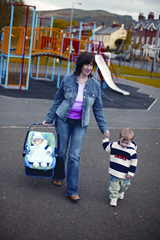An overview
 Tackling child poverty and providing permanent homes for children in care are important areas in the Executive’s children’s policy. Meadhbh Monahan summarises its approach.
Tackling child poverty and providing permanent homes for children in care are important areas in the Executive’s children’s policy. Meadhbh Monahan summarises its approach.
Overseen by OFMDFM, which is responsible for “promoting and protecting” the interests of children, children’s policy also straddles the 12 government departments.
A ministerial sub-committee for children and young people is chaired by junior ministers Jonathan Bell and Martina Anderson. Its priorities are tackling child poverty, an early years strategy, provision of mental health and disability services for vulnerable children, safeguarding (including support for parents, families and carers), provision for children with special needs and provision of school transport.
The children’s sector consists of numerous children’s charities, interest and lobby groups looking out for children’s rights and welfare.
‘A ten year strategy for children and young people in Northern Ireland 2006-2016’ set out what would be done by the Executive and the Courts Service to ensure that, by 2016, children are:
• healthy;
• enjoying, learning and achieving;
• living in safety and with stability;
• experiencing economic and environmental well-being;
• contributing positively to community and society; and
• living in a society which respects their rights.
The draft Programme for Government (PfG) pledges to fulfil the Executive’s commitment, under the Child Poverty Act, to reduce child poverty. It also pledges to ensure that all children have the opportunity to participate in shared education and to increase the number of schools sharing facilities. The safeguarding of children and adults most at risk from harm would be improved by ensuring better health and well-being, reducing offending, improving community safety, and improving access to justice. The long-term outcomes of the children of teenage mothers from disadvantaged backgrounds would be improved by rolling out the family nurse partnership programme to a new term. The 10-year strategy is cited as one of the draft PfG’s “building blocks”.
Martina Anderson has told the Assembly that a policy lead has been appointed by OFMDFM to ensure that there is “a co-ordinated and collaborative approach” to children’s policy across departments. An ‘outcomes model’ has also been sent to all departments.
On child poverty, Jonathan Bell told members that “it is difficult to disaggregate the work that is being done on child poverty from that which is being done on family poverty.”
He added: “We are specifically targeting work to ensure that children have the right skills not only to make them employable but to allow them to offer those skills in the future. We want to give those young people a better way out.”
An action plan for 2008-2011 aimed to complement the existing 10-year strategy and the following cross-cutting strategies and policies:
• The Lifetime Opportunities Strategy which aimed to work towards eliminating child poverty by 2020 (despite child poverty in Northern Ireland increasing);
• The play and leisure policy which aims to deliver on the 10-year strategy through the establishment of ‘policy implementation groups’ for 0-11s and 12-18s;
• The draft Cohesion, Sharing and Integration Strategy which has called for “positive alternatives” for young people who become involved in violence and disorder, and for schools to become places for the whole community to use; and
• The draft strategic approach for victims and survivors which deals with the “trans-generational impact of the Troubles”.
Based on the 10-year strategy’s six criteria for healthy and balanced children, the action plan calls for health initiatives to tackle poor mental health, eating disorders, disability services and healthy school meals. A 15-bed children’s mental health unit was opened at Foster Green hospital in September 2010.
To ensure children and young people’s economic and environmental well-being, the action plan calls for the “eradication” of child poverty and opportunities for children in rural areas to benefit from projects such as accessible rural transport, day care provision and crèches.
Projects such as Fit Futures and Sure Start fulfil this criteria, while the ‘Warm Healthier Homes’ fuel poverty strategy classifies under 16s as ‘vulnerable’ and therefore resources will be targeted towards them.
The action plan calls for an early years strategy in the ‘enjoying learning and achieving’ category. A draft early years (0-6) strategy was published in 2010 aiming to improve services to the youngest children, their parents and families for the next five years.
More foster carers, adoptions and a database of foster carers were called for in order to ensure that children are living in safety and with stability. However, there is a shortage of foster carers and adoptive families in Northern Ireland. It currently takes approximately three years and six months for a child to be adopted from care in Northern Ireland. An Adoption (and Children) Bill is expected to be brought to the Assembly in 2013 aiming to speed up the process of placing children in care with a permanent family.





